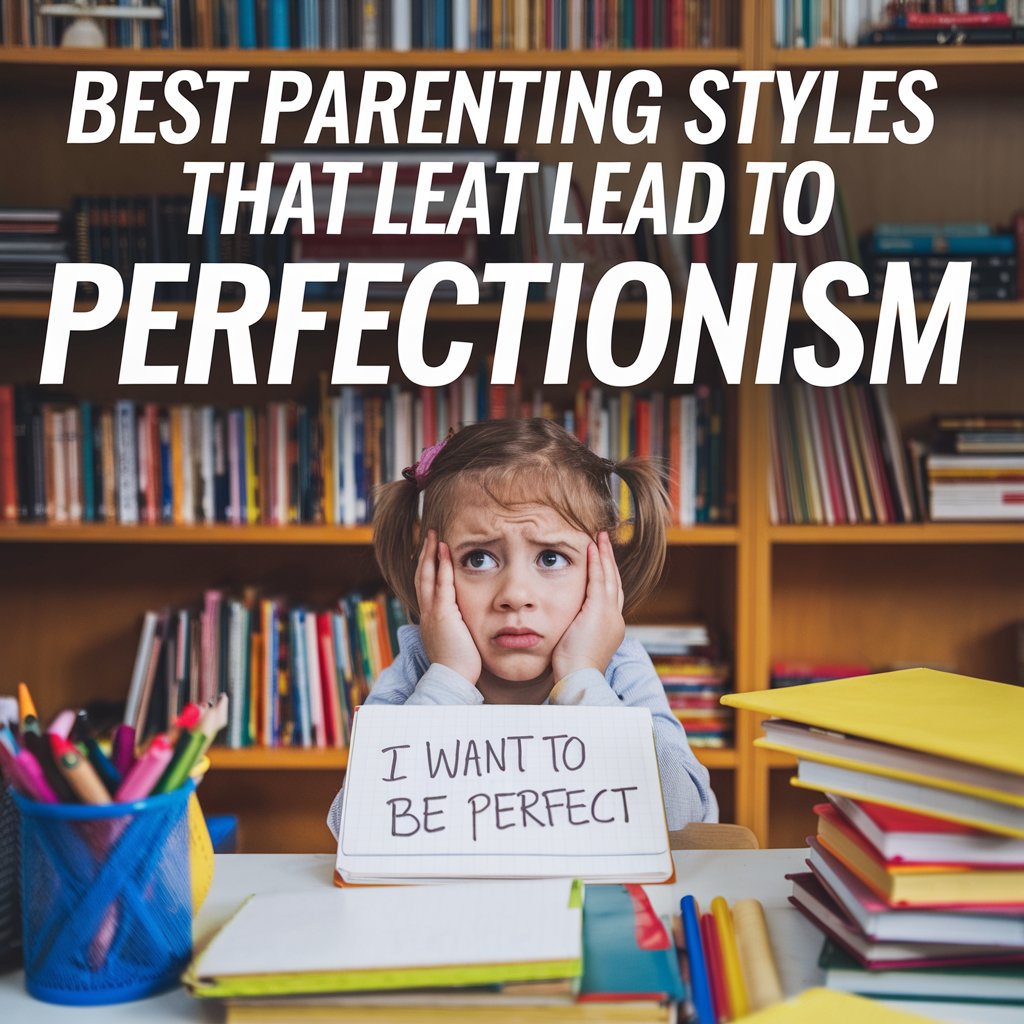Parenting plays a pivotal role in shaping children’s personalities, values, and emotional responses. Among these influences, certain parenting styles significantly contribute to the development of perfectionist traits in children. Perfectionism, often misunderstood as striving for excellence, is more about the relentless pursuit of unattainable standards, accompanied by self-criticism and fear of failure.
In this article, we explore best parenting styles that lead to perfectionism, emphasizing how each approach impacts children’s psychological and emotional well-being. Whether you recognize your own upbringing or parenting style in these descriptions, understanding these dynamics can help create healthier relationships and foster positive self-worth in children.
What is Perfectionism?

Perfectionism involves the obsessive drive to achieve flawlessness and meet excessively high standards. While it might seem like a pursuit of excellence, perfectionism often leads to anxiety, self-doubt, and feelings of inadequacy. People who struggle with perfectionism frequently tie their self-worth to achievements and external validation, creating a cycle of chronic stress and dissatisfaction.
The roots of perfectionism are complex, involving factors such as personality traits, cultural influences, and experiences. However, one of the most profound influences is parenting style. Let’s dive into the 10 best parenting styles that inadvertently contribute to the development of perfectionist tendencies.
1. Demanding Parents: Setting the Bar Too High
Demanding parents prioritize external accomplishments, often valuing success over emotional well-being. They tie their self-esteem to their children’s achievements, which creates immense pressure for children to excel.
Characteristics:
- Constant focus on grades, awards, and accolades.
- Verbal and physical discipline to enforce compliance.
- Little regard for the child’s emotions or desires.
Impact on Children:
- Fear of failure becomes a driving force.
- Children internalize the belief that love and worth are conditional on success.
- A strong inclination toward perfectionism as a means to gain approval.
2. Perfectionist Parents: Modeling Unattainable Standards
Perfectionist parents embody perfectionism themselves, showcasing an unrelenting pursuit of success in every aspect of life. While they may not directly demand perfection from their children, their behavior sets an implicit expectation.
Characteristics:
- Focus on achievements rather than character or effort.
- A spotless home, polished appearance, and high societal standing.
- Excessive praise for accomplishments rather than intrinsic qualities.
Impact on Children:
- Children mirror their parents’ perfectionist tendencies.
- They grow up believing that flaws are unacceptable.
- Emotional vulnerability is suppressed, as perfection becomes a shield against criticism.
3. Distracted Parents: Neglecting Emotional Needs
Distracted parents provide for their children’s physical needs but fail to address their emotional well-being. This lack of connection leads children to strive for perfection to gain attention or alleviate parental burdens.
Characteristics:
- Long working hours or excessive screen time.
- Rushing from one activity to another with minimal emotional engagement.
- Subtle reinforcement of the idea that worth is tied to achievements.
Impact on Children:
- A need to excel to earn their parents’ attention.
- Feelings of inadequacy and invisibility.
- Perfectionism as a coping mechanism to fill the emotional void.
4. Overwhelmed Parents: Unintentional Emotional Neglect
Overwhelmed parents, burdened by life’s challenges, may struggle to create a stable and nurturing environment for their children. Their inability to cope effectively often places undue responsibilities on their children.
Characteristics:
- Inconsistent or overly harsh rules.
- Unrealistic expectations or no expectations at all.
- Chronic stress due to mental illness, addiction, or external pressures.
Impact on Children:
- Children blame themselves for family problems, feeling responsible for fixing them.
- Perfectionism becomes a way to restore order and stability in an unpredictable environment.
- Emotional resilience is compromised, replaced by self-doubt and guilt.
5. Authoritarian Parents: The Rule-Enforcers
Authoritarian parents emphasize obedience and discipline over understanding and empathy. Their rigid approach leaves little room for mistakes, fostering a fear-based drive for perfection.
Characteristics:
- Strict rules with little explanation or flexibility.
- Severe punishments for mistakes or noncompliance.
- Minimal emotional warmth or encouragement.
Impact on Children:
- A belief that mistakes are unacceptable.
- Perfectionism becomes a survival strategy to avoid punishment.
- Limited self-expression and creativity due to fear of judgment.
6. Helicopter Parents: Overinvolved and Overcontrolling
Helicopter parents closely monitor every aspect of their children’s lives, leaving little room for independence. While their intentions are rooted in love, their actions inadvertently convey that only perfect results are acceptable.
Characteristics:
- Micromanaging children’s schedules, academics, and hobbies.
- Preventing children from experiencing failure or setbacks.
- Overemphasis on competition and external validation.
Impact on Children:
- A dependency on external guidance for decision-making.
- Anxiety and perfectionism arise from fear of disappointing parents.
- Stunted problem-solving skills and reduced resilience.
7. Overprotective Parents: Shielding from Failure
Overprotective parents go to great lengths to shield their children from failure, discomfort, or adversity. While this approach aims to keep children safe, it also fosters an unrealistic expectation of flawlessness.
Characteristics:
- Avoidance of situations where children might struggle.
- Immediate intervention in conflicts or challenges.
- Emphasis on maintaining a perfect image.
Impact on Children:
- Difficulty coping with setbacks or criticism.
- Perfectionism as a defense mechanism against perceived inadequacies.
- Limited risk-taking and exploration due to fear of failure.
8. Neglectful Parents: Absence of Guidance
Neglectful parents provide minimal structure, support, or involvement in their children’s lives. This lack of guidance forces children to navigate life on their own, often driving them toward perfectionism as a form of self-regulation.
Characteristics:
- Emotional and physical unavailability.
- Indifference toward the child’s achievements or struggles.
- Minimal expectations or responsibilities.
Impact on Children:
- A sense of isolation and insecurity.
- Perfectionism as a way to gain control and self-worth.
- Increased susceptibility to anxiety and self-criticism.
9. Comparative Parents: Measuring Success Against Others
Comparative parents constantly compare their children to peers, siblings, or societal standards. This creates a competitive environment where perfection is seen as the only way to stand out or gain approval.
Characteristics:
- Frequent comparisons to higher-achieving individuals.
- Criticism for not meeting external benchmarks.
- Unrealistic pressure to surpass others.
Impact on Children:
- A belief that love and approval are conditional on outperforming others.
- Chronic self-doubt and fear of falling short.
- Perfectionism as a means to gain superiority and validation.
10. Ambitious Parents: Living Vicariously Through Children
Ambitious parents project their own unfulfilled dreams and aspirations onto their children. They push their children to achieve what they couldn’t, often disregarding the child’s interests or limits.
Characteristics:
- High expectations tied to personal goals or societal status.
- Limited consideration of the child’s passions or abilities.
- Emphasis on prestige and accomplishments.
Impact on Children:
- A struggle to balance personal desires with parental expectations.
- Perfectionism as a way to fulfill parental dreams.
- Difficulty establishing a sense of self independent of achievements.
Breaking the Cycle of Perfectionism

If you recognize yourself or your upbringing in these parenting styles, it’s important to take steps to break the cycle. Here are some strategies to foster healthy self-esteem and resilience in children:
- Encourage Effort, Not Perfection: Focus on praising effort and progress rather than results.
- Model Self-Compassion: Show children that making mistakes is a natural part of growth.
- Create a Safe Emotional Environment: Validate children’s feelings and encourage open communication.
- Promote Independence: Allow children to make choices and learn from their experiences.
- Balance Expectations: Set realistic goals that consider the child’s unique abilities and interests.
Conclusion
The best parenting styles can shape a child’s emotional and psychological development, but when skewed, they can inadvertently lead to perfectionism. Whether it’s demanding, distracted, or overprotective parenting, the common thread is an inability to nurture a child’s emotional needs fully.
Recognizing these patterns can help parents make conscious choices to foster healthier relationships and self-perceptions. By focusing on love, support, and understanding rather than achievement, we can raise children who value themselves for who they are, not just what they accomplish.




